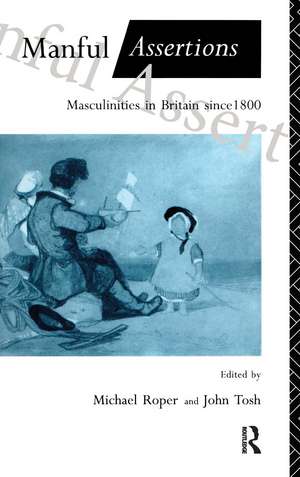Manful Assertions: Masculinities in Britain Since 1800
Autor Michael Roper, John Toshen Limba Engleză Paperback – 4 iul 1991
Preț: 130.21 lei
Preț vechi: 182.75 lei
-29% Nou
Puncte Express: 195
Preț estimativ în valută:
24.92€ • 26.08$ • 20.62£
24.92€ • 26.08$ • 20.62£
Comandă specială
Livrare economică 17-31 martie
Doresc să fiu notificat când acest titlu va fi disponibil:
Se trimite...
Preluare comenzi: 021 569.72.76
Specificații
ISBN-13: 9780415053235
ISBN-10: 0415053234
Pagini: 232
Dimensiuni: 138 x 216 mm
Greutate: 0.45 kg
Ediția:1
Editura: Taylor & Francis
Colecția Routledge
Locul publicării:Oxford, United Kingdom
ISBN-10: 0415053234
Pagini: 232
Dimensiuni: 138 x 216 mm
Greutate: 0.45 kg
Ediția:1
Editura: Taylor & Francis
Colecția Routledge
Locul publicării:Oxford, United Kingdom
Cuprins
1 INTRODUCTION, Historians and the politics of masculinity 2 STRENUOUS IDLENESS Thomas Carlyle and the man of letters as hero 3 DOMESTICITY AND MANLINESS IN THE VICTORIAN MIDDLE CLASS The family of Edward White Benson 4 MASCULINITY AND THE ‘REPRESENTATIVE ARTISAN’ IN BRITAIN, 1850-80 5 ‘I LIVE BUT NOT YET I FOR CHRIST LIVETH IN ME’ Men and masculinity in the Salvation Army, 1865-90, 6 THE BLOND BEDOUIN Lawrence of Arabia, imperial adventure and the imagining of English-British masculinity 7 KNOWING YOUR PLACE The tensions of manliness in boys’ story papers, 1918-8 MUMMY, MATRON AND THE MAIDS Feminine presence and absence in male institutions, 1934-63, 9 YESTERDAY’S MODEL Product fetishism and the British company man, 1945-85.
Notă biografică
Michael Roper recently completed his Ph.D. at Essex University on masculinity and the evolution of British management since 1945. He has published in Life Stories and the Journal of Australian Studies, and he is a Research Fellow at the London Business School. John Tosh teaches history at the Polytechnic of North London. In 1987-8 he was Visiting Associate Professor at the University of California, Davis.
Descriere
This volume combines current discussions in sexual politics with historical analysis to demonstrate that, far from being natural and monolithic, masculinity is an historical and cultural construct, with varied, competing and above all changing forms.
